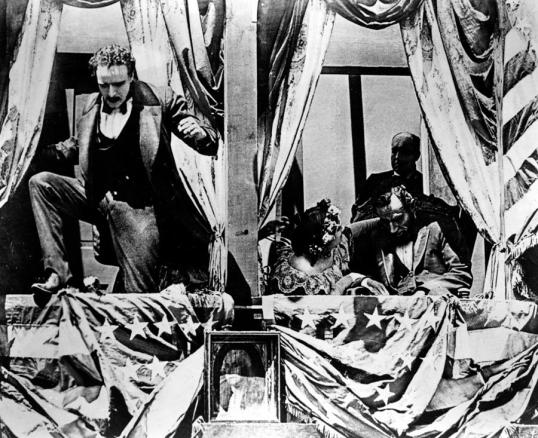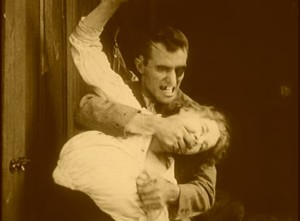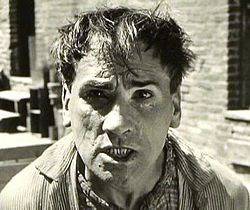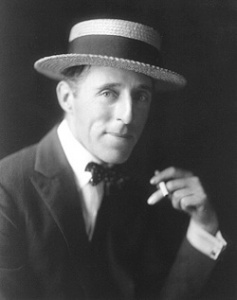
John Wilkes Booth (Raoul Walsh) flees after shooting Abraham Lincoln in D.W. Griffith’s Birth Of A Nation
The second annual Academy Awards were handed out on January 20th, 1916. For the second and final time, the ceremony took place in the Empire Room of the Waldorf Hotel in New York City. Just as in the previous year, the awards were handed out after dinner and a speech from Academy President Mack Sennett. Again, the winners were announced before the actual ceremony and were given certificates of achievement. According to contemporary reports, the winners who were present all gave brief acceptance speeches but nobody bothered to record what anyone said.
As in the previous year, winners were selected by a jury of distinguished citizens. The 1915 jury consisted of:
- Harry Chandler, businessman
- Owen McAleer, former mayor of Los Angeles, California
- Ellery Sedgwick, publisher of Atlantic Monthly
- Mack Sennett, director, producer, and President of the Academy
- Jess Willard, world heavyweight boxing champion
- Harry Leon Wilson, novelist
- General Leonard Wood
Behind the scenes, the 2nd Annual Academy Awards were mired in controversy and drama. It all boiled down to one question: What to do about Birth of a Nation? Directed and produced by Academy co-founder D.W. Griffith, Birth of a Nation set records for both its running time and its popularity at the box office. It was also the first American film to ever be screened at the White House and was reportedly highly praised by President Woodrow Wilson. Many members of the Academy — including D.W. Griffith, who aggressively campaigned for his film — felt that there was no way the film could be denied the award for best picture.
However, there were other members of the Academy who felt that, as an organization dedicated to improving the image of the film industry, there was no way they could honor Griffith’s film. Birth of a Nation was a highly controversial film. An epic set during and after the Civil War, Birth of a Nation was pro-Confederate in its sentiments and it portrayed the Ku Klux Klan in a heroic light. Even by the standards of 1915, Birth of a Nation was a shockingly racist film. The film was protested by both the NAACP and social reformer Jane Addams. Following showings of the film, race riots broke out in Boston and Philadelphia. Several local censorship boards, citing concerns that the film was un-American and that showings would lead to violence, refused to allow the film to play in their cities.
When the awards were announced, Birth of a Nation only received one, for best engineering effects. An angry Griffith declined to attend the ceremony and his certificate of achievement still sits, unclaimed, in the Academy archives. Reportedly, Griffith held Mack Sennett responsible for the failure of Birth of a Nation to win best picture.
Instead, the award for best picture went to Regeneration, a film about a gangster (Rockliffe Fellowes) who is redeemed by the love of a good woman (Anna Q. Nilsson). A box office and critical success when it was first released, Regeneration is considered to be the first gangster film. Ironically, the film’s director, Raoul Walsh, played John Wilkes Booth in Birth of a Nation.
Along with honoring Regeneration, the jury awarded a special award to Giovanni Pastrone, the director of the Italian epic Cabiria. Cabiria was one of the most acclaimed films to be released in America in 1915 and was apparently given some consideration for the best picture award before the jury decided that the award should go to an American film.
Finally, the popular Mary Pickford won her first Academy Award for her performance in Madame Butterfly. Despite the award, Pickford always considered Madame Butterfly to be one of her least favorite of her many films.
The 2nd Annual Academy Awards
(All films released in the U.S. during 1915 were considered to be eligible. Only winners were announced)
Best Picture
Regeneration. Produced by William Fox. Directed by Raoul Walsh. Fox Film Corporation.
Best Director, Comedy Picture
Christy Cabanne for Double Trouble. Triangle Film Corporation.
Best Director, Dramatic Picture
Cecil B. DeMille for The Cheat. Paramount.
Best Actor
George Beban in The Italian. Paramount.
Best Actress
Mary Pickford in Madame Butterfly. Paramount.
Best Writing
The Senator. Sydney Rosenfeld. Triumph Films.
Best Cinematography
Inspiration. Lawrence E. Williams. Mutual Films.
Best Art Direction
Carmen. Georges Benoit and George Schniederman. Fox Film Corporation.
Best Engineering Effects
The Birth of a Nation. D.W. Griffith. Epoch Producing Corporation.
Best Title Writing.
A Fool There Was. Porter Emerson Browne. Fox Film Corporation.
Special Award
Cabiria. Directed by Giovanni Pastrone. George Kleine Attractions.
Trivia:
Regeneration is the first crime film to ever win the Academy Award for best picture.
Cabiria is both the first Italian and the first non-American film to win an Academy Award.
Cecil B. DeMille became the first person to win two Oscars. (He was previously recognized for directing the 1914 best picture winner, The Squaw Man.)
For the second of two times, there are no nominees and only the winners are announced.
For the second of two times, no film wins more than one award.










